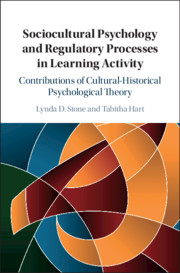 Sociocultural Psychology and Regulatory Processes in Learning Activity
Sociocultural Psychology and Regulatory Processes in Learning Activity Published online by Cambridge University Press: 30 September 2019
In Chapter 2, we offer a theoretical frame referred to as the relational habitus (RH), which can be used to conceptualize, observe, and document how meaning-making processes are co-constructed over interactional and historical time. The RH is an ecological ensemble of relations including self, tools, tasks, and others that is intersubjectively constructed and sustained over time in formal and informal learning communities. The RH helps explain how variances in the social organization of regulatory processes are related to the structure of activities in learning arenas, the interactional processes in activities, and movement in the social and psychological spaces of these arenas. The RH encompasses three interrelated aspects of intersubjectivity: (1) an orientation to others in cultural contexts, (2) mutual perspective-taking accomplished through communication, and (3) perspective-making during learning. These aspects explain how regulatory processes emerge from and change through meaning-making by the agential actions of individuals and the situational structuring of these actions.
To save this book to your Kindle, first ensure [email protected] is added to your Approved Personal Document E-mail List under your Personal Document Settings on the Manage Your Content and Devices page of your Amazon account. Then enter the ‘name’ part of your Kindle email address below. Find out more about saving to your Kindle.
Note you can select to save to either the @free.kindle.com or @kindle.com variations. ‘@free.kindle.com’ emails are free but can only be saved to your device when it is connected to wi-fi. ‘@kindle.com’ emails can be delivered even when you are not connected to wi-fi, but note that service fees apply.
Find out more about the Kindle Personal Document Service.
To save content items to your account, please confirm that you agree to abide by our usage policies. If this is the first time you use this feature, you will be asked to authorise Cambridge Core to connect with your account. Find out more about saving content to Dropbox.
To save content items to your account, please confirm that you agree to abide by our usage policies. If this is the first time you use this feature, you will be asked to authorise Cambridge Core to connect with your account. Find out more about saving content to Google Drive.